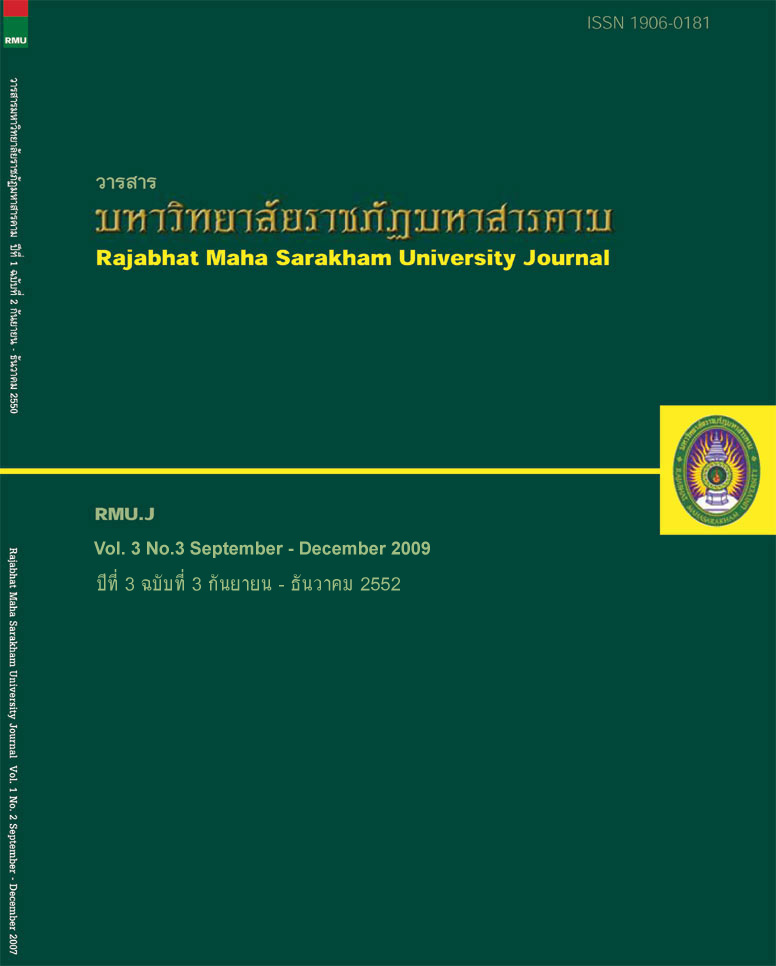พัฒนาการกฎหมายรัฐธรรมนูญของประเทศไทย Constitutional Law Development of Thailand
Main Article Content
บทคัดย่อ
การวิจัยเรื่อง พัฒนาการกฎหมายรัฐธรรมนูญของประเทศไทย โดยมีวัตถุประสงค์ เพื่อศึกษาพัฒนาการกฎหมายรัฐธรรมนูญของประเทศไทยตั้งแต่อดีตถึงปัจจุบัน เพื่อศึกษารัฐธรรมนูญในแต่ละฉบับมีสาระสำคัญอย่างไรและแตกต่างกันหรือ
ไม่อย่างไร เพื่อศึกษาทิศทางหรือพัฒนาการรัฐธรรมนูญของประเทศไทยในอนาคตน่าจะเป็นอย่างไรวิจัยเรื่องนี้ได้ทำการศึกษาจากการเปรียบเทียบรัฐธรรมนูญของประเทศไทยทั้ง 18 ฉบับ ในสาระสำคัญและที่มาของรัฐธรรมนูญในแต่ละฉบับ ทั้งในส่วน
อำนาจหน้าที่และที่มาของสถาบันการปกครองประเทศอันได้แก่ สถาบันประมุข นิติบัญญัติ บริหาร และตุลาการ การควบคุมตรวจสอบการใช้อำนาจหน้าที่ของรัฐ และสิทธิเสรีภาพของประชาชนตามรัฐธรรมนูญฉบับนั้นๆ ผลการวิจัยพบว่า
1. หลังจากประเทศไทยมีการเปลี่ยนแปลงการปกครองจากระบอบสมบูรณาญาสิทธิราชย์มาเป็นระบอบประชาธิปไตยอันมีพระมหากษัตริย์ทรงเป็นประมุข ตั้งแต่ปี พ.ศ. 2475 เป็นต้นมา ประเทศไทยมีการประกาศใช้รัฐธรรมนูญเป็นกฎหมายสูงสุด
ในการปกครองประเทศมาแล้ว 18 ฉบับ โดยในรัฐธรรมนูญฉบับต้นๆ จะบัญญัติถึงการได้มาซึ่งอำนาจการปกครองของผู้ปกครองมากกว่าที่จะคำนึงถึงบทบัญญัติที่เกี่ยวกับการส่งเสริมและคุ้มครองสิทธิและเสรีภาพของประชาชน
2. พัฒนาการกฎหมายรัฐธรรมนูญไทยตั้งแต่ในช่วงรัฐธรรมนูญฉบับที่ 16 - 18 (พ.ศ. 2540 - 2550) เป็นต้นมารัฐธรรมนูญไทยได้ให้ความสำคัญกับการส่งเสริม คุ้มครอง สิทธิและเสรีภาพของประชาชนมากยิ่งขึ้น โดยการให้ประชาชนได้เข้ามามี
ส่วนร่วมทางการเมืองมากขึ้น
3. ทิศทางหรือพัฒนาการรัฐธรรมนูญของประเทศไทยในอนาคต จากการเรียกร้องให้มีการปฏิรูปการเมืองในหลายๆด้าน ทั้งในส่วนการสร้างองค์กรและระบบการตรวจสอบการใช้อำนาจรัฐที่มีประสิทธิภาพ ในการร่างรัฐธรรมนูญของประเทศไทยในอนาคตควรมีเป้าหมายที่คำนึงถึงคือ
3.1 การส่งเสริมและคุ้มครองสิทธิเสรีภาพของประชาชนเป็นหลัก โดยให้ประชาชนได้เข้ามามีส่วนร่วมในการปกครองระดับชาติและระดับท้องถิ่นเพิ่มมากยิ่งขึ้น
3.2 ปรับปรุงโครงสร้างทางการเมืองให้มีความโปร่งใสและมีเสถียรภาพมากยิ่งขึ้น ให้เป็นที่ยอมรับของประชาชน
3.3 ปรับปรุงโครงสร้างขององค์กรและระบบการตรวจสอบการใช้อำนาจรัฐให้มีประสิทธิภาพมากยิ่งขึ้นไป
The purposes of this research were t o: study the constitutional law development of Thailand from the past up to the present, study the differences of the substance for each constitution, and study the direction or the constitutional development of Thailand in the future. The research studied and
compared the eighteen previous constitutions according to the main substances alongside the origins of
each constitution in terms of both all power and authority of the government institutions, including
constitutional monarchy, legislature, administration and justice, control and investigatigation of state
power use as well as people’s liberty and rights based on each constitution.
The results revealed as follows:
1. After having been ruled by an absolute monarchy and then changed into constitutional
monarchy since 1922 A.D., Thailand was announced to use the constitution as the supreme law using
eighteen previous constitutions. Instead of taking the constitutional Act of people’s rights and liberty
promotion and protection into consideration, the previous constitutions were focused on how the state
governors obtained their authority.
2. In terms of the constitutional law development of Thailand after the 16th -18th constitutions
(1997-2007 A.D.), the Thai people were allowed to involve and participate more extensively in politics
than in the past.
3. Regarding the direction or the constitutional law development of Thailand in the future, the
political reformed of the organization construction, and the effective investigation system into the state
power use for drafts of Thailand constitution in the future. They included the promotion and protection of
people’s liberty and rights for the participation in both national and local politics, the improvement of the
political structures for accountability and stability, and the improvement of the organization structures as
well as the effective investigation system into the state power use.
Article Details
1. บทความที่ลงตีพิมพ์ทุกเรื่องได้รับการตรวจทางวิชาการโดยผู้ประเมินอิสระ ผู้ทรงคุณวุฒิ (Peer Review) สาขาที่เกี่ยวข้อง อย่างน้อย 3 ท่าน ในรูปแบบ Double blind review
2. ข้อคิดเห็นใด ๆ ของบทความที่ลงตีพิมพ์ในวารสารมหาวิทยาลัยราชภัฏมหาสารคาม นี้เป็นของผู้เขียน คณะผู้จัดทำวารสารไม่จำเป็นต้องเห็นด้วย
3. กองบรรณาธิการวารสารมหาวิทยาลัยราชภัฏมหาสารคาม ไม่สงวนสิทธิ์การคัดลอกแต่ให้อ้างอิงแสดงที่มา


